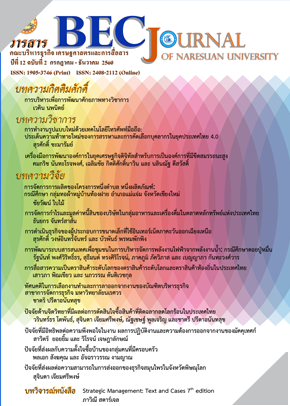Attitudes of Naresuan University BBA Business Management Graduates towards Job Selection and Resignation
Main Article Content
Abstract
There are a large number of students graduating with Bachelor degrees in Thailand each year. What were the most significant criteria for those students when they selected their jobs? For graduate students who found work, how satisfied are they with their jobs? For those who have worked after graduation, but later resigned from their jobs, what were the most significant causes of their resignation? These questions are important for universities and workplaces to plan for providing undergraduate students with the skills and knowledge they need to cope with the labor market and retain employees as valuable resources for organizations.
The study conducted questionnaire surveys to access the attitudes of former students of the Bachelor of Business Administration, Business Management Major, Naresuan University towards job selection and resignation. Results showed that the major reasons of job selection are as follows: looking after parents, progress in career path, interest in the field, stable job, chance to prove abilities, saving money and favorable income. Reasons for resignation are as follows: no challenge, no chance to present leadership and no progress in career path.
Article Details
References
ชาตรี ปรีดาอนันทสุข. (2556). เปลี่ยนมุมมองของการจัดการวิกฤตด้วยแนวคิดการ
จัดการวิกฤตเชิงบูรณาการ.วารสารบริหารธุรกิจ เศรษฐศาสตร์ และการสื่อสาร, 8(1),
-38.
สำนักงานคณะกรรมการอุดมศึกษา. (2559). ข้อมูลสถิติการศึกษา. สืบค้นเมื่อ 15
เมษายน 2559, จาก http://www.info.mua.go.th/information/show_all_statdata_table.php?data_show=3
สำนักงานสถิติแห่งชาติ. (2557). สำรวจความต้องการแรงงานของสถานประกอบการ
พ.ศ. 2556. สืบค้นเมื่อ 15 เมษายน 2559, จาก
http://service.nso.go.th/nso/nsopublish/service/survey/labourDemRep56.pdf
Clarkson, M.B.E. (1995). A Stakeholder Framework for analyzing and
evaluating Corporate Social Performance. Academy of
Management Review, 20(1), 92-117.
Donaldson, T. and Preston, L.E. (1995). The Stakeholder Theory of
the Corporation: Concepts,Evidence and Implications. Academy of
Management Review, 20(1), 65-91.
Freeman, R.E., Harrison, J.S., Wicks, C.A., Parmar, B. and de Colle,
S. (2010). Stakeholder Theory: The State of the Art. New York:
Cambridge University Press.
Naresuan University. (2016). Retrieved April 20, 2016, from
Preedaananthasuk, C. (2014). Integrated Crisis Management: What
did We Learn from Flood Management in Thailand? Universal
Journal of Industrial and Business Management, 2(7), 151-155.
Saari, L.M. and Judge, T.A. (2004). Employee Attitudes and Job
Satisfaction. Human Resource Management, 43(4), 395-407.
Webometrics. (January 2016 Edition). Retrieved May 10, 2016, from
http://www.webometrics.info/en/Asia/thailand
Translated Thai References
Preedaananthasuk, C. (2013). Change Crisis Management viewpoints
with Integrated Crisis Management Approach. BEC Journal of
Naresuan University, 8(1), 27-38.
Office of the Higher Education Commission. (2016). Information of
Educational Statistics. Retrieved April 15, 2016, from
http://www.info.mua.go.th/information/show_all_statdata_table.php?data_show=3
National Statistical Office. (2014). The 2013 Labour Demand of
Establishment Survey. Retrieved April 15, 2016, from
http://service.nso.go.th/nso/nsopublish/service/survey/labourDemRep56.pdf


